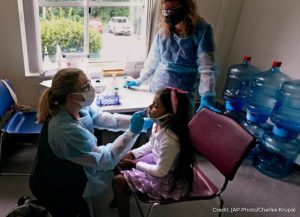COVID-19 Through The Lens Of Urban Community School Nurses
 The COVID-19 pandemic has taken a serious toll on our urban community children’s mental health as they continue to face fear, grief, and uncertainty. Before the pandemic, children in our urban communities encountered mental health challenges that were already deeply concerning. COVID-19 not only deepened the wounds but added a different health care disparity. Our urban children’s mental health is compromised. They have endured so much throughout this pandemic, and while much of the attention is often placed on physical health consequences from COVID-19, we cannot overlook the escalating mental health crisis our inner-city children are facing. Many students have been impacted by loss of a loved one. Research suggests children of color in our urban communities have disproportionately experienced the pain of losing family or a caregiver during the COVID-19 pandemic.
The COVID-19 pandemic has taken a serious toll on our urban community children’s mental health as they continue to face fear, grief, and uncertainty. Before the pandemic, children in our urban communities encountered mental health challenges that were already deeply concerning. COVID-19 not only deepened the wounds but added a different health care disparity. Our urban children’s mental health is compromised. They have endured so much throughout this pandemic, and while much of the attention is often placed on physical health consequences from COVID-19, we cannot overlook the escalating mental health crisis our inner-city children are facing. Many students have been impacted by loss of a loved one. Research suggests children of color in our urban communities have disproportionately experienced the pain of losing family or a caregiver during the COVID-19 pandemic.
As urban community school nurses, we have always expressed concern about our children’s emotional, behavioral, and academic health long before this pandemic because of the socio-economic circumstances they reside in. The trajectory of this public health crisis has significantly impacted urban community children and families in different ways than other communities. We are committed to caring for our students with increased signs of mental health trauma that will forever impact their young lives, and the lives of their families and communities. The future health of our urban communities is largely determined by how effectively school nurses work with community stakeholders to eliminate health disparities among those populations experiencing a disproportionate challenge of disease, disability, and death. Extensive health disparities, and inequities in our urban communities are unacceptable and indeed correctable.
We also recognize this pandemic has created a mental health crisis in urban community children, and realize the urgency in advocating for their health, and well-being in and out school. Many urban community students and their families have long encountered adversities such as social determinants of health (SDOH), and healthcare inequity now magnified from COVID-19. As urban community school nurses we are charged with implementing interventions, and strategies that contribute to the socio-economic survival and academic success of all students.
In the midst of this still existing pandemic, what we need as urban community school nurses is advocacy from our school districts, and community stakeholders to effectively perform our tasks in addressing the health disparities and inequities we see on a daily basis. We also need to be heard, and seated at the discussion table with administrators, and Board of Education members to enhance and sustain diversity and inclusion to obtain appropriate medical resources that reduce health disparities, address SDOH, and promote health equity in urban school districts.
For example, while several school districts utilized their school nurses in promoting a smooth seamless process for in-person learning this school year after engaging in months of remote learning, not all school districts included their school nurses in the reopening process and are clueless to the needs of adequately managing a Health Office in the midst of the pandemic. Since schools remained open for daily in-person learning, many school nurses especially in urban communities have expressed concerns about their personal safety while caring for students in their buildings despite COVID regulations, not having the necessary staffing, PPE, nor medical supplies for their Health Offices to properly care for the children they see.
When it comes to the safety and wellbeing of our staff and students, who better than school nurses, the only medical professional in the building, to consult ensuring that COVID regulations are adhered to. For some school nurses, these concerns are in addition to addressing the food, clothing, and residential insecurities students and families still face after being hard hit by the pandemic. As we enter year four of the COVID-19 pandemic, what’s needed are safe spaces for school nurses to express their concerns, ask for what’s needed, and opportunities to contribute in rectifying the matters at hand. As respected student advocates, we are well suited serving as leaders in doing the critical work of effectively addressing healthcare disparities. As a healthcare leader practicing in the urban community for 35 years, addressing healthcare needs in this population is a proven effective strategy for school nurses to reduce chronic absence, promote awareness, and foster equity in healthcare.
- Cynthia Samuel PhD, RN, CSN-NJ




